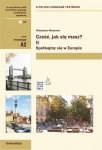-
Załączniki bezpieczeństwa
Załczniki do produktuZałączniki dotyczące bezpieczeństwa produktu zawierają informacje o opakowaniu produktu i mogą dostarczać kluczowych informacji dotyczących bezpieczeństwa konkretnego produktu
-
Informacje o producencie
Informacje o producencieInformacje dotyczące produktu obejmują adres i powiązane dane producenta produktu.UNIVERSITAS
-
Osoba odpowiedzialna w UE
Osoba odpowiedzialna w UEPodmiot gospodarczy z siedzibą w UE zapewniający zgodność produktu z wymaganymi przepisami.
Kontynuacja książki "Cześć, jak się masz?" stanowi odpowiedni podręcznik do nauki języka polskiego jako obcego na poziomie A2.
Każda z 14 lekcji zawiera:
- Dialog
- Warto zapamiętać te słowa! Nowe słownictwo
- Gramatyka jest ważna. Komentarz gramatyczny
- Jak to powiedzieć? Komentarz komunikacyjny
- Powiedz to poprawnie! Ćwiczenia gramatyczne
- Muszę to zrozumieć! Ćwiczenia na rozumienie ze słuchu
- Czy umiesz to powiedzieć? Ćwiczenia komunikacyjne
Cześć, jak się masz? Spotkajmy się w Europie!
1. How to give people best wishes on holidays and namedays. Imperative mood.
2. Ordinal, cardinal numbers, hours.
3. How to ask and give advice. Irregular verb "powinien" and verbal collocations with the verbs "prosić, musieć, trzeba, warto, powinien"
4. How to express concern and anxiety. Dative of personal pronouns. How Christmas is celebrated in Poland.
5. How to write private and formal letters in Polish. Future tense.
6. Expressions and sentences which are useful while travelling in Poland. Compartison of adjectives. Degrees of intensivity of qualities.
7. Geographical facts about Poland. Prepositions. Cases.
8. How to ask permissions and give commands. Comparison of adverbs.
9. How to form the conditional mood and use it in polite offers, invitations, and requests.
10. Phrases and expressions used in telephone conversations.
11. Forms of genitive and accusative plural.
12. How to conduct a conversation
13. How to form the nominative plural of masculine nouns, used when talking about groups of people and groups of men.
14. Spotkajmy się w Europie. Declension of Polish names and surnames.
+ Polish-English Dictionary
+ Language Proficiency test for level A2
SPIS TREŚCI:
Lekcja 1
1.1. Wszystkiego najlepszego
Vocabulary
Warto zapamiętać te słowa! - IMIENINY
1.2. Gramatyka jest ważna. Grammatical commentary
1.2.1. The imperative mood: forms and functions
1.2.2. The present tense of the verb życzyć
1.3. Jak to powiedzieć? Communicative commentary
1.3.1. Conveying your good wishes
1.3.2. Popular names and name day dates
1.4. Powiedz to poprawnie! Exercises in grammar
1.5. Muszę to zrozumieć! Comprehension exercises
1.6. Czy umiesz to powiedzieć? Communicative activities
Lekcja 2
2.1. Nie wiem, co robić?
Vocabulary
Warto zapamiętać te słowa! - MIESZKANIE
2.2. Gramatyka jest ważna. Grammatical commentary
2.2.1. Forming ordinal numbers from cardinal numbers
2.2.2. The use of ordinal numbers
2.3. Jak to powiedzieć? Communicative commentary
2.3.1. Expressing time and hour
2.4. Powiedz to poprawnie! Exercises in grammar
2.5. Muszę to zrozumieć! Comprehension exercises
2.6. Czy umiesz to powiedzieć? Communicative activities
Lekcja 3
3.1. Radzę wyjechać do domu
Vocabulary
Warto zapamiętać te słowa! - ŻYCIE CODZIENNE
3.2. Gramatyka jest ważna. Grammatical commentary
3.2.1. Conjugation of the irregular verb powinien, powinna
3.2.2. Use of infinitives of perfective and imperfective verbs after prosić, musieć, trzeba, warto, powinien
3.3. Jak to powiedzieć? Communicative commentary
3.3.1. Giving advice
3.3.2. Expressing sympathy
3.4. Powiedz to poprawnie! Exercises in grammar
3.5. Muszę to zrozumieć! Comprehension exercises
3.6. Czy umiesz to powiedzieć? Communicative activities
Lekcja 4
4.1. Nie będziesz sam
Vocabulary
Warto zapamiętać te słowa! - ODZIEŻ MĘSKA I DAMSKA
4.2. Gramatyka jest ważna. Grammatical commentary
4.2.1. The dative of personal pronouns and courtesy titles, and its use
4.2.2. Forms nie ma, nie było, nie będzie
4.3. Jak to powiedzieć? Communicative commentary
4.3.1. Expressing concern and worry
4.3.2. Expressing negative feelings
4.4. Powiedz to poprawnie! Exercises in grammar
4.5. Muszę to zrozumieć! Comprehension exercises
4.6. Czy umiesz to powiedzieć? Communicative activities
Lekcja 5
5.1. Wszystko będzie dobrze
Vocabulary
Warto zapamiętać te słowa! - POCZTA: LISTY I PRZESYŁKI
5.2. Gramatyka jest ważna. Grammatical commentary
5.2.1. Future tense of the imperfective verbs
5.2.2. Future tense of the perfective verbs
5.2.3. Expressing time: the use of the expressions rok temu and za rok
5.3. Jak to powiedzieć? Communicative commentary
5.3.1. Writing letters - patterns
5.3.2. Expressing hope
5.4. Powiedz to poprawnie! Exercises in grammar
5.5. Muszę to zrozumieć! Comprehension exercises
5.6. Czy umiesz to powiedzieć? Communicative activities
Lekcja 6
6.1. Jak tam dojechać?
Vocabulary
Warto zapamiętać te słowa! - ŚRODKI TRANSPORTU
6.2. Gramatyka jest ważna. Grammatical commentary
6.2.1. A. Comparison of adjectives
B. Syntax of comparison with adjectives
6.2.2. Use of expressions coraz + comparative
6.3. Jak to powiedzieć? Communicative commentary
6.3.1. Travels
6.3.2. Expressing spatial relations
6.4. Powiedz to poprawnie! Exercises in grammar
6.5. Muszę to zrozumieć! Comprehension exercises
6.6. Czy umiesz to powiedzieć? Communicative activities
Lekcja 7
7.1. Wolę pracować
Vocabulary
Warto zapamiętać te słowa! - POLSKA - MAPA GEOGRAFICZNA
7.2. Gramatyka jest ważna. Grammatical commentary
7.2.1. Use of prepositions with cases
7.2.2. Prepositions taking two cases
7.2.3. Complex sentences
7.3. Jak to powiedzieć? Communicative commentary
7.3.1. Geografia Polski
7.4. Powiedz to poprawnie! Exercises in grammar
7.5. Muszę to zrozumieć! Comprehension exercises
7.6. Czy umiesz to powiedzieć? Communicative and cultural activities
Lekcja 8
8.1. Chyba mam grypę
Vocabulary
Warto zapamiętać te słowa! - CZŁOWIEK - BUDOWA CIAŁA
8.2. Gramatyka jest ważna. Grammatical commentary
8.2.1. Comparison of adverbs
8.2.2. Combining modal verbs with infinitives
8.3. Jak to powiedzieć? Communicative commentary
8.3.1. A. Asking for permission
B. Rules for using czy mogę, czy można
8.3.2. Giving orders
8.3.3. Expressing possibility
8.4. Powiedz to poprawnie! Exercises in grammar
8.5. Muszę to zrozumieć! Comprehension exercises
8.6. Czy umiesz to powiedzieć? Communicative activities
Lekcja 9
9.1. Zaopiekujesz sie mną?
Vocabulary
Warto zapamiętać te słowa! - EUROPA
9.2. Gramatyka jest ważna. Grammatical commentary
9.2.1. The conditional mood
9.3. Jak to powiedzieć? Communicative commentary
9.3.1. Unia Europejska
9.4. Powiedz to poprawnie! Exercises in grammar
9.5. Muszę to zrozumieć! Comprehension exercises
9.6. Czy umiesz to powiedzieć? Communicative activities
Lekcja 10
10.1. Czy mógłbym rozmawiać z Agnieszką
Vocabulary
Warto zapamiętać te słowa! - MIESZKANIE: ŁAZIENKA I TOALETA
10.2. Gramatyka jest ważna. Grammatical commentary
10.2.1. Dative singular and plural of nouns
10.2.2. Dative singular and plural of adjectives
10.2.3. Declension of the nouns tydzień, rok
10.3. Jak to powiedzieć? Communicative commentary
10.3.1. Telephone conversations
10.4. Powiedz to poprawnie! Exercises in grammar
10.5. Muszę to zrozumieć! Comprehension exercises
10.6. Czy umiesz to powiedzieć? Communicative activities
Lekcja 11
11.1. Chciałem, żeby ci było miło
Vocabulary
Warto zapamiętać te słowa! - MIESZKANIE: KUCHNIA
11.2. Gramatyka jest ważna. Grammatical commentary
11.2.1.A. Genitive plural of nouns and modifiers
B. Genitive plural of modifiers
C. Use of genitive after the word ile
11.2.2. Accusative plural of masculine personal nouns
11.2.3. Syntax of the verb chcieć
11.3. Jak to powiedzieć? Communicative and cultural commentary
11.3.1.A. Expressing positive feelings
B. Expression of one's own feelings
11.3.2. Expressions: podoba mi się and lubię
11.4. Powiedz to poprawnie! Exercises in grammar
11.5. Muszę to zrozumieć! Comprehension exercises
11.6. Czy umiesz to powiedzieć? Communicative activities
Lekcja 12
12.1. Samodzielne opinie, samodzielne decyzje
Vocabulary
Warto zapamiętać te słowa! - BIBLIOTEKA I CZYTELNIA
12.2. Gramatyka jest ważna. Grammatical commentary
12.2.1. The vocative singular of nouns
12.2.2. Declension of foreign names and surnames
12.3. Jak to powiedzieć? Communicative commentary
12.3.1. Having a conversation
12.3.2. Polish writers who are most frequently translated into foreign languages
12.4. Powiedz to poprawnie! Exercises in grammar
12.5. Muszę to zrozumieć! Comprehension exercises
12.6. Czy umiesz to powiedzieć? Communicative activities
Lekcja 13
13.1. Polacy są niestereotypowi
Vocabulary
Warto zapamiętac te słowa! - EUROPA - MAPA GEOGRAFICZNA
13.2. Gramatyka jest ważna. Grammatical commentary
13.2.1.A. Nominative plural of masculine personal nouns and modifiers
B. Nominative plural of the modifiers of masculine personal nouns
C. Using modifiers in nominative plural of masculine personal nouns
13.3. Jak to powiedzieć? Communicative commentary
13.3.1. Requesting and offering help
13.3.2. Offers of help and acknowledging them
13.3.3. Promises without requesting help
13.4. Powiedz to poprawnie! Exercises in grammar
13.5. Muszę to zrozumieć! Comprehension exercises
13.6. Czy umiesz to powiedzieć? Communicative activities
Lekcja 14
14.1. Spotkajmy się gdzieś w Europie
Vocabulary
Warto zapamiętać te słowa! - WAKACJE: CAMPING I PLAŻA
14.2. Gramatyka jst ważna. Grammatical commentary
14.2.1. Spatial relations expressed by verb prefixes
14.2.2. Declension of Polish names and surnames
14.2.3. Subjectless expressions such as mówi się
14.2.4. Declension of nouns such as Amerykanin in the plural
14.3. Jak to powiedzieć? Communicative commentary
14.3.1. Expressing neccessity
14.3.2. Małe polskie miasta
14.4. Powiedz to poprawnie! Exercises in grammar
14.5. Muszę to zrozumieć! Comprehension exercises
14.6. Czy umiesz to powiedzieć? Communicative and cultural activities
Polish-English Dictionary
LANGUAGE PROFICIENCY TEST
for Level A2
I. Listening Comprehension
II. Reading Comprehension
III. Accuracy
IV. Writing
V. Speaking
A The second part of the "Cześć, jak się masz?" course is suitable for A2 learners of Polish as a foreign language. A novelty is that in each of the units of this part there is specific focus on listening, reading, speaking and writing. The cultural section lays emphasis on the image of Poland against the background of other EU countries.
Die Fortsetzung des ersten Teils des Lehrwerks "Cześć, jak się masz?" stellt eines geeignetes Buch für das Erlernen des Polnischen als Fremdsprache auf der Niveaustufe A2 des GER dar. Eine Neuheit gegenüber dem ersten Teil ist die Berücksichtigung von Übungen zum Hörverstehen, Leseverstehen, Sprechen und Schreiben in jeder einzelnen Lektionseinheit. Im kulturellen Teil wird auf das Bild Polens vor dem Hintergrund der Europäischen Union eingegangen.
Продолжение первой части учебного пособия. "Cześć, jak się masz?" – это соответсвующий материал для изучения польского языка как иностранного на уровне А2. Новшеством по сравнению с первой частью является обращение особого внимания к упражнению восприятия на слух, пониманию письменного текста, умению говорить и писать. В части посвященной культуре представлен образ Польши на фоне других государств Европейского Союза.


 970 szt.
970 szt.





 4 szt.
4 szt.


 1 szt.
1 szt.

